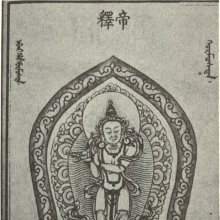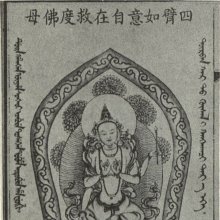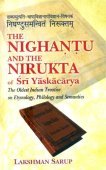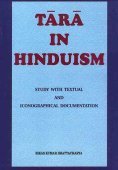Deity, Deities: 2 definitions
Introduction:
Deity means something in Hinduism, Sanskrit. If you want to know the exact meaning, history, etymology or English translation of this term then check out the descriptions on this page. Add your comment or reference to a book if you want to contribute to this summary article.
Images (photo gallery)
(+660 more images available)
In Hinduism
Shilpashastra (iconography)
Source: SOAS University of London: Protective Rites in the Netra Tantra (shilpa)Iconography of Deities within the Bhairava Tantras.—Deities appear in multiple forms, sometimes manifesting as mantras and at others resembling their Purāṇic forms. The practitioner uses these scriptural depictions of deities to call forth a visualized form that appears on the ritual diagram, the maṇḍala. He then performs sacrificial rites in which he presents the deity ritual offerings and asks for salvation (mokṣa) or worldly enjoyments (bhoga).

Shilpashastra (शिल्पशास्त्र, śilpaśāstra) represents the ancient Indian science (shastra) of creative arts (shilpa) such as sculpture, iconography and painting. Closely related to Vastushastra (architecture), they often share the same literature.
General definition (in Hinduism)
Source: Shodhganga: Elements of Art and Architecture in the Trtiyakhanda of the Visnudharmottarapurana (h)Deities are well-represented in Hindu temples which ultimately serve to connect man and the divine and to help the people to develop their spiritual knowledge.—The temple is a place where the devotees can get the environment to connect themselves with their lords. The Hindu temple consists of all the cosmic elements from fire to water, images of nature to deities, Gods remain feminine to masculine, kāma to artha, fleeting sounds and incense smells etc. by which one can celebrate life. Stella Kramrisch, the author of The Hindu Temple also keeps her view point in the same spirit. The Hindu temples are designed for the purpose of making connection between man and the divine and to help the people to develop their spiritual knowledge and truth.
See also (Relevant definitions)
Ends with: Atmospheric deity.
Full-text (+8199): Indra, Brahma, Marut, Yantra, Mantra, Aditya, Gandharva, Devaka, Surya, Vishva, Grihadevata, Rudra, Kapala, Yaksha, Mahadeva, Deva, Jayanta, Vijaya, Apa, Bhairava.
Relevant text
Search found 352 books and stories containing Deity, Deities; (plurals include: Deities, Deitieses). You can also click to the full overview containing English textual excerpts. Below are direct links for the most relevant articles:
Satapatha-brahmana (by Julius Eggeling)
Kāṇḍa XII, adhyāya 1, brāhmaṇa 3 < [Twelfth Kāṇḍa]
Kāṇḍa XIII, adhyāya 5, brāhmaṇa 3 < [Thirteenth Kāṇḍa]
Kāṇḍa XII, adhyāya 8, brāhmaṇa 2 < [Twelfth Kāṇḍa]
Women in the Atharva-veda Samhita (by Pranab Jyoti Kalita)
32. Glorification of Women through the Eulogy of the Female Deities < [Chapter 4 - Female Deities and the Glorification of Women in the Atharvaveda]
31. Some Other Female Deities < [Chapter 4 - Female Deities and the Glorification of Women in the Atharvaveda]
3. Goddess Asunīti < [Chapter 4 - Female Deities and the Glorification of Women in the Atharvaveda]
The Wheel Of The Dhamma Begins To Turn < [Forty-five Years Of Teaching]
The Twelve-spoked Wheel Of Dhamma < [Forty-five Years Of Teaching]
Guhyagarbha Tantra (with Commentary) (by Gyurme Dorje)
Text 11.19 (Commentary) < [Chapter 11 (Text and Commentary)]
Text 8.24 (Commentary) < [Chapter 8 (text and commentary)]
Introduction 2.2: Making of offerings to the Maṇḍala < [Chapter 9 (Text And Commentary)]
Karmic Astrology—a Study (by Sunita Anant Chavan)
Part 1.3 - Karma in the Saṃhitā Period < [Chapter 3 - Development of Jyotiḥśāstra and Karman in the Literature]
Part 2.1.4 - Deities of light < [Chapter 2 - Jyotiḥśāstra and the Concept of Karman]
Part 1.4 - Correlation of Jyotiṣa and Karma in the Saṃhitā Period < [Chapter 3 - Development of Jyotiḥśāstra and Karman in the Literature]
Parama Samhita (English translation) (by Krishnaswami Aiyangar)
Related products
(+12 more products available)










